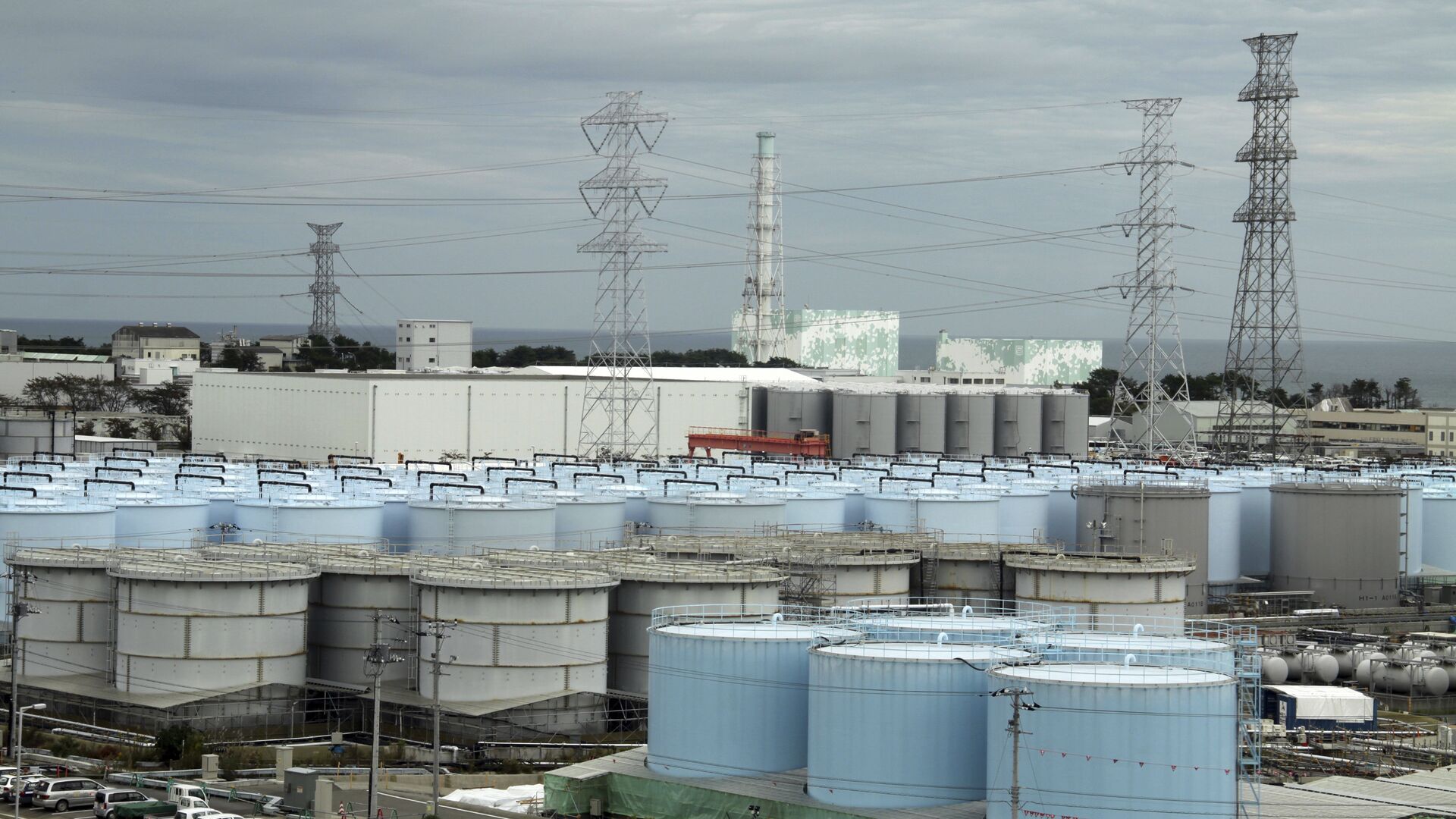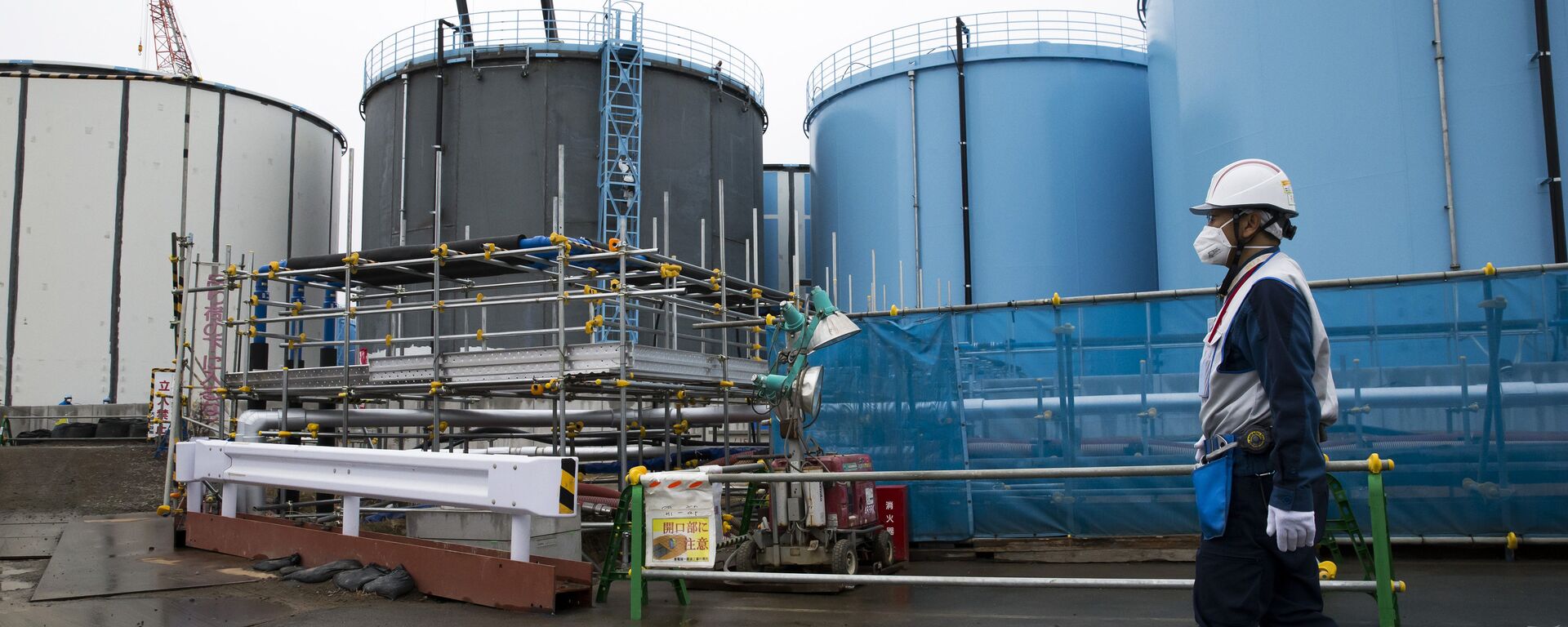https://sputnikglobe.com/20230629/iaea-head-plans-to-visit-some-states-over-tokyos-water-discharge-from-fukushima-1111540852.html
IAEA Head Plans to Visit Some States Over Tokyo's Water Discharge From Fukushima
IAEA Head Plans to Visit Some States Over Tokyo's Water Discharge From Fukushima
Sputnik International
The International Atomic Energy Agency (IAEA) is preparing its head, Rafael Grossi,'s upcoming visit to South Korea, New Zealand and the Cook Islands to clarify the agency's position on Tokyo's plans to discharge contaminated water from the Fukushima nuclear power plant (NPP), Japanese media reported.
2023-06-29T08:22+0000
2023-06-29T08:22+0000
2023-07-31T17:00+0000
world
fukushima
international atomic energy agency (iaea)
japan
tokyo
https://cdn1.img.sputnikglobe.com/img/106091/77/1060917747_0:156:3001:1844_1920x0_80_0_0_d0ef4c01be8914cb18618a35ccfbe04f.jpg
Grossi is planning to visit the three countries following his meeting with Japanese Prime Minister Fumio Kishida in Tokyo on July 4, where the IAEA chief is expected to present the agency's report containing its assessment of the safety of releasing treated water from the NPP to the ocean, the newspaper reported, citing sources. So far, the IAEA has completed two inspections at the Fukushima NPP and released six reports, in which it has assessed the method and facilities for the discharge as appropriate. In 2021, Japan announced its plan to dispose of Fukushima's treated water and invited the IAEA to verify its safety. Some countries, including New Zealand and South Korea, have opposed Japan's plans, with Tokyo hoping that Grossi's mission would change their views, Yomiuri Shimbun reported. Tokyo had initially planned to begin discharging water purified of all radionuclides except tritium into the ocean 1 kilometer (0.6 miles) away from the station this spring. However, the deadline was pushed back to the summer of 2023 due to adverse weather conditions and other delays. The Fukushima nuclear disaster occurred on March 11, 2011. The plant was severely damaged by a magnitude 9 earthquake in the Pacific Ocean. This triggered a massive tsunami that hit the plant and caused three nuclear reactors to melt down. The accident is considered the worst nuclear disaster since the Chernobyl accident in 1986 and has resulted in widespread contamination of local soil and water. The disaster left 22,200 people dead or missing.
https://sputnikglobe.com/20230606/system-for-water-release-at-japans-fukushima-npp-to-be-completed-in-june---reports-1110948382.html
fukushima
japan
tokyo
Sputnik International
feedback@sputniknews.com
+74956456601
MIA „Rossiya Segodnya“
2023
Sputnik International
feedback@sputniknews.com
+74956456601
MIA „Rossiya Segodnya“
News
en_EN
Sputnik International
feedback@sputniknews.com
+74956456601
MIA „Rossiya Segodnya“
Sputnik International
feedback@sputniknews.com
+74956456601
MIA „Rossiya Segodnya“
international atomic energy agency, fukushima nuclear power plant
international atomic energy agency, fukushima nuclear power plant
IAEA Head Plans to Visit Some States Over Tokyo's Water Discharge From Fukushima
08:22 GMT 29.06.2023 (Updated: 17:00 GMT 31.07.2023) TOKYO (Sputnik) - The International Atomic Energy Agency (IAEA) is preparing its head, Rafael Grossi,'s upcoming visit to South Korea, New Zealand and the Cook Islands to clarify the agency's position on Tokyo's plans to discharge contaminated water from the Fukushima nuclear power plant (NPP), Japanese media reported.
Grossi is planning to visit the three countries following his meeting with Japanese Prime Minister Fumio Kishida in Tokyo on July 4, where the IAEA chief is expected to present the agency's report containing its assessment of the safety of releasing treated water from the NPP to the ocean, the newspaper reported, citing sources.
So far, the IAEA has completed two inspections at the Fukushima NPP and released six reports, in which it has assessed the method and facilities for the discharge as appropriate.
In 2021, Japan announced its plan to dispose of Fukushima's treated water and invited the IAEA to verify its safety. Some countries, including New Zealand and South Korea, have opposed Japan's plans, with Tokyo hoping that Grossi's mission would change their views, Yomiuri Shimbun reported.
Tokyo had initially planned to begin discharging water purified of all radionuclides except tritium into the ocean 1 kilometer (0.6 miles) away from the station this spring. However, the deadline was pushed back to the summer of 2023 due to adverse weather conditions and other delays.
The
Fukushima nuclear disaster occurred on March 11, 2011. The plant was severely damaged by a magnitude 9 earthquake in the Pacific Ocean. This triggered a massive tsunami that hit the plant and caused three nuclear reactors to melt down. The accident is considered the worst nuclear disaster since the Chernobyl accident in 1986 and has resulted in widespread contamination of local soil and water. The disaster left 22,200 people dead or missing.



